 It’s holiday season again, which means it’s time for one of my favorite traditions: Watching the 2003 film Love Actually with my wife, pretending not to like it, but actually enjoying myself.
It’s holiday season again, which means it’s time for one of my favorite traditions: Watching the 2003 film Love Actually with my wife, pretending not to like it, but actually enjoying myself.
A crucial piece of this tradition is spending some time after the viewing breaking down just how ridiculous, creepy, and strange some of the movie’s nine mini-stories actually are. Because — let’s face it — as charming and spirited as its cast is, as hard as it tries to convey some ambiguous “meaning of Christmas,” as warm as many its best moments are…
Love Actually is not, strictly speaking, a “good” movie.
Then again, I watch it every year, have a good time, and talk about it for a few days afterwards, so if that’s not the sign of SOMETHING noteworthy and compelling, what is? Part of the movie’s appeal is that the sheer star power of and British charm of the cast overpowers everything else. Part of it is that we don’t spend long enough with any individual story or character for any of the low quality elements to drag the story down.
I just watched it again recently, so I wanted to take the time and break down the stories (I count nine major threads), ranking them on a) how well they work on an actual storytelling level, and b) how messed up some of the actual events and themes are.
Normally in these types of lists, I start with the least favorites and count down to the most favorite,but I’m going to do the opposite here. As Love Actually‘s stories get worse, they become more fascinating on a “train wreck” level and so there’s more to talk about.
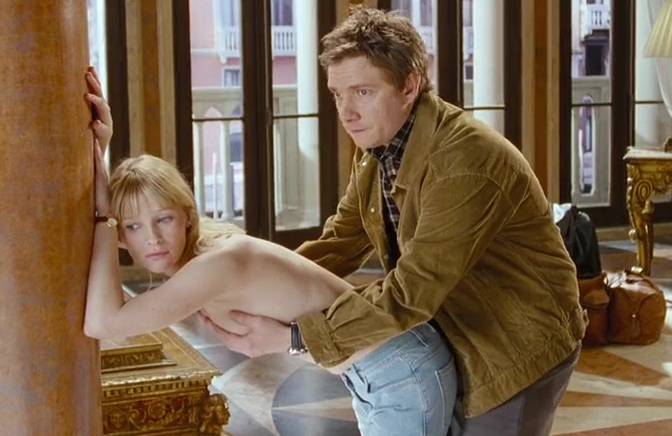
1. Martin Freeman and Joanna Page
The #1 choice on my list earns the top spot not because it is exceptionally great, but because there’s virtually nothing to complain about, which… as you’ll see… is automatically enough to put it in the movie’s upper echelon.
The entire point of this vignette is the juxtaposition between these characters’ R-rated jobs and their overall sweetness and innocence otherwise. There are lots of visual gags around that theme (primarily of Page in in some sort of embarrassing, provocative position) that are pretty amusing,
But the real reason this story works — and is the least offensive among Love Actually‘s lineup — is because Page and especially Freeman are so damn adorable. Baby-faced Freeman is a legend for awkward, British, dorky charm, and he brings exactly what the role needs so that there’s some warmth underneath the story’s central gag.
(Only mark against this story: Page’s stilted, on-the-nose line of “All I want for Christmas is you.” Oh hey, that’s a song! I wonder if we’ll hear it by movie’s end!)
2. Bill Nighy and Gregor Fisher
The movie’s lone plot devoted to friendship is another (relative) winner. Bill Nighy is totally convincing as a swaggering, curmudgeonly rock star cashing in on his expiring fame. He’s a legitimately charming presence and delivers one of my favorite performances in the movie.
And kudos to the movie for declining to make his manager, Gregor Fisher too noble. He’s just a quiet, friendly guy looking out for the reckless Bill Nighy. Their final scene when Nighy decides to spend his Christmas with his manager is a bit awkwardly written, but very sweet.
Of course, I could point out how ludicrous the plot of Nighy trying to make #1 is, or how unsymapthetic Nighy’s character really should be (shilling off a cover of a song he admits is crappy), or how weird it is that the sweet scene at the manager’s apartment ends with the pair of them agreeing to get drunk and watch porn together… but, again, I’m calling it a relatively successful story in the context of the movie. The bar for competence and coherence is not that high.
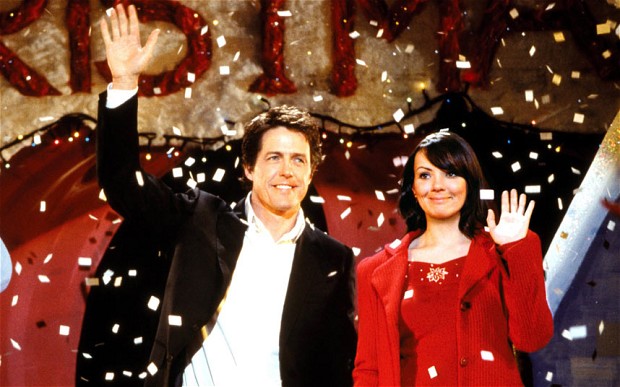
3. Hugh Grant and Martine McCutcheon
What’s with this movie and male employers falling for female subordinates? Is that a particular fantasy for someone on the writing staff? Or do the professional boundaries of a workplace simply provide interesting romantic conflict?
Regardless, I find the story of Hugh Grant as Prime Minister falling for his aide to be the least troublesome and most enjoyable of the stories in the on-the-job romance category. First, there’s an actual story here, with a beginning, middle, and end, which can definitely not be said of all of the storylines in the movie. Second, there are a lot of charming scenes like the Christmas Caroling, the bizarre speech, and — of course — the dance (possibly the most winning moment in the movie). I also have no problem with the Clinton-esque Billy Bob Thornton as the take-what-I-want US president.
On the other hand… the recurring fat jokes aimed towards the perfectly fit and attractive McCutcheon are somewhere between baffling and appalling. There are a few other unsettling things, too. For one, the couple getting caught smooching back stage is played as a cute blunder. Whoops! Guess the cat’s out of the bag. How cute! But isn’t it tantamount to a HUGE scandal for Grant to be caught canoodling with a former employee? Very Lewinsky-esque. And there are several bits here — some of the offhanded remakrs that Grant makes, the way he casually fires her when he feels “uncomfortable” around her — that reek of old-white-guy-writing-with-no-editor syndrome.
(I’ve also seen it pointed out that the part of the plot where Grant has to go knocking on doors to find McCutcheon is stupid because he could just have someone look at the employment records. But I really like that sequence, so I’m going to ignore that plot hole.)
Last thought: I have always thought it was funny that the extent of Grant being a badass prime minister is making a speech about David Beckham and Sean Connery. I’m sorry, but that if that’s the best the movie can do to show us a heroic and patriotic leader, then maybe the UK DOES need the US looking after them.
4. Colin Firth and Lucia Moniz
Less than halfway down the list, and we’re already starting to stretch for what qualifies as a good “story.” Colin Firth finds out his girlfriend is cheating on him with his brother, a thread that arises and is dropped very rapidly and disruptively, all as a prelude to sending him to France where he can meet the Portugese-speaking housekeepr, Aurelia. (Note: Male employer falling for female subordinate, #2.)
The two speak different languages, and thus can’t verbally communicate, but manage to speak with their “hearts.” These scenes exhibit good chemistry between Firth and Moniz and feature some solid jokes through subtitles about when Colin and Lucia are (or are not) trying to say the same thing. But it doesn’t matter exactly what they’re saying, because, you know, they’re falling in love. (Except that’s bullshit, because there is no connection between this couple except physical attraction… they don’t know a damn thing about each other.)
It all builds to a pretty entertaining climax. Firth spends weeks learning Portugese, then flies back to propose to Aurelia. But she’s at work, so her dad (after making some demeaning remarks about Aurelia’s overweight sister), brings him to the restaurant she’s a waiter at. He confesses his love and proposes in Portugese, and she accepts in English, which she learned because she’s in love with him too.
I will admit the scene where the whole town follows Firth, he proposes, and she accepts is both romantic and quite funny. But there are an absurd amount of holes in it. First, why does he propose marriage? Why not, I don’t know, get to know her first? Second, she apparently went through the arduous task of learning English in just a couple weeks “just in cases” Firth decided to come propose? That doesn’t make any damn sense.
There’s also something off about the depiction of Aurelia’s home town. Their depiction is a whole lost-in-translation type gag that manages to make the Portuguese look dumb with “selling off your daughter” jokes.
In short, this pair shares some nice moments and a very sweet, memorable ending, but it lags in the “plausibility” and “cultural sensitivity” and “character development” departments.
5. Kris Marshall and the American Girls
I would buy just about any placement of this story in the ranking of the nine stories. It’s a stupid anti-joke, one that goes all in on its radically dumb ending but manages to feel relatively amusing and coherent because of it.
Don’t remember this one? Here’s a reminder: Kris Marshall is a gawky, mildly obnoxious guy who decides that he’d be a sex god in America. The movie sets up to let him down at every point, before dragging on his hopes a little bit longer and a little bit longer. We keep waiting for the hammer to drop, only it never does. The movie ends with him doing exactly what he says he’s going to do: Going to America and instantly becoming a Casanova who lands a bunch of supermodel babes. It’s as simple and dumb as that.
If you hate this story, I wouldn’t blame you in the slightest, because it’s really stupid. If you love this story because it’s a subversive bit of structural humor amid the chaotic, misguided mess of narratives that surround it, I also wouldn’t judge you. I’m sticking it square in the middle of the rankings because I embrace both interpretations.
Kris Marshall is perfectly cast as a guy who viewers can’t decide whether to root for or against. On the one hand, his misguided enthusiasm is endearing. On the other, his face is kind of weird. I’ll leave up to you to make the final judgment.
6. Emma Thompson, Alan Rickman, and Heike Makatsch
I categorize entries #6-8 on this list all as stories that had lots of promise, and are interesting in theory, but completely botch the execution. I’m definitely willing to debate the order of these three (I’ve actually switched them around a few times as I’ve been writing this and thinking about it), but I’m definitely NOT willing to debate the fact that all of these stories are complete turds.
So the adultery story is troublesome in several ways. First, it feels tonally strange in Love Actually — it’s the only story with any real drama, the only story that inspires even a little bit of anguish in viewers. Ostensibly, you could argue that this makes it stand out as compelling, but in practice, whenever this plot gets screen time, I’m just waiting for the next goofy scene of Hugh Grant dancing around or Lucia Moniz stripping down to her skivvies. The movie’s stab at marital drama just weighs it down.
Second major problem: Makatsch as Mia the temptress. She’s definitely an outright villain (the devil horns a good indicator of this), and so she feels a bit out of place. More crucially, she just lacks any sense of realism or plausibility or depth. She is simply a shallow storytelling device who throws her body at Alan Rickman. She has no character traits and goes through no development. This is troubling both on a storytelling level, and also on a gender roles level. You just wish she had some redeeming values.
(Note: Male employer falling for female subordinate, #3.)
Third problem — a recurring one for stories in this movie — there’s no stinking ending. This leaves the story on an unsatisfying note that makes it feel like at least one more script revision was required. However, I at least get the sense that the writers were trying to say something with its ambiguous ending. For all the nice stories here that wrap up with a bow and a kiss and a “happily ever after,” here’s a reminder that something DOES happen after the honeymoon. It would have been easy for the writers to have Snape back out of cheating on his wife, but he goes through with it and faces (at least the prospect of) the consequences. So, on a certain level, it’s a little bit daring to throw that bit of darkness in. I can just imagine someone writing the script saying, “fuck it, let’s have him actually cheat on his wife and see where that takes it.” The answer: It doesn’t take us anywhere, but it does so in a way I don’t entirely despise… But that still doesn’t make it a good story.
Okay, with those three significant concerns about why this story made it into the movie, why did I rank it about #s 7 and 8?
Because Emma Thompson.
Whenever Emma Thompson is on screen, she bowls you over. It makes you wonder if she has better material to work with, or if she’s just trying harder than anyone else. The answer is probably a bit of both. Regardless, Thompson feels like the only one doing any actual “acting” in this movie. She’s so good when she discovers her husband’s cheating on her, so good when she bumps into Hugh Grant at the Christmas show and tears up, so funny when she rants about lobsters at the Nativity scene… She’s my Love Actually MVP. Way to go, Emma. Too bad your story is a festering, inconclusive pile of crap.
7. Liam Neeson and Jojen Reed
This one makes me pull my hair out. It really has SO much promise. It easily could have been the best story in the movie if its script was even 50% sensible. But alas, it’s frustrating and misguided.
The high point of this story comes at the beginning of the movie, when Neeson makes his moving speech at the funeral of his wife, the mother of his stepson Sam. From there it rapidly spirals downward into putrid nonsense and never returns to coherence when the movie really needs it to.
So let’s break the issues down: The most bewildering problem is how horrid Neeson’s paternal guidance to his stepson Sam is. Sam’s mother just died, and immediately Sam starts obsessing with a girl who shares his mother’s name, and what does Neeson do? He barely bats an eye. He plays along with it. He refuses to acknowledge that Sam may be struggling with some deeper issues. (It’s possible that Neeson recognizes this, but if so, he never indicates it; more on this in a second.) So after he learns that Sam is “in love” with a girl (whom he’s never had a conversation with, by the way), he a) laughs off Sam’s joke that he thought about trying to kidnap her, b) gives him the awful advice of pretending to be interested in topics that the girl is rather than hoping the girl will like him for himself, and c) fails to explain the difference between “attraction” and “love” to Sam… though there are a lot of characters in this movie who would do well to learn that lesson. I feel like Sam is going to be Andrew Lincoln’s character in 20 years.
Second huge problem: The story never turns around to acknowledge that grief and loneliness following the death of Sam’s mother is what is actually driving him, and instead focuses on the Sam-Joanna “romance.” I feel like there are a crucial few scenes missing for this story to make any remote amount of sense. Alternately, you could completely cut out the subplot of the death of Sam’s mom, which would make the story feel lightweight but would at least make more sense. Even then, though, I just don’t care about Sam’s obsessive crush on Joanna. It doesn’t make for a cute or good story… unless you find some greater prism through which to view it… Which the story is completely set up to do with the mom’s death. Ugh.
This middle ground of having the parental death subplot, but dropping it about three scenes in, is really just a catastrophe.
And, while we’re sussing out the problems with this story, I should point out that Liam Neeson telling his stepson that he and any potential future girlfriends are going to have sex all over the house, including in Sam’s room, might be the single creepiest, strangest moment in a movie filled with creepy, strange moments.
8. Laura Linney and Underpants Karl
I really want to like this story more because Laura Linney is wonderful as the American vanguard in this otherwise tea-sipping, Redcoat cast. I also like the idea of a story about embracing family members even when it makes life hard. Unfortunately, the execution is miserable.
First of all, the script and direction give us almost no sense as to why Linney’s character is madly in love with Karl except that he’s tall, dark, and handsome. For an actress who radiates depth and complexity, this shallow attraction doesn’t make any damn sense.
But it might be enough if there was at least any character development to Karl. He has about five total lines in the movie and seems to exist solely to look good while wearing boxer briefs. (He also mysteriously acquires an accent in his last couple scenes that was not detectable earlier in the movie.)
(Edit: As my wife pointed out in the comments, I might have dropped the ball in my discussion of Sarah’s brother, but I decided to leave the next two paragraphs as-is even though I’ve changed my mind a little bit.)
The moral of this story — that sometimes we have to choose between sacrificing our personal lives for bigger issues — also lands with a thud for two reasons. First of all is that her brother is shown to lack many empathetic (or even sympathetic) traits. During phone conversations, he seems crazy, and in person he seems angry and delusional. (This may be realistic, but it doesn’t make for good story. Show us that it’s worth it to for Linney to give up Underpants Karl.)
The second issue here is that it just doesn’t make sense that her brother would be able to sabotage her life the way he does. Can’t the doctors prevent her brother from calling her every two minutes? Isn’t that the point of having him in a facility like the one depicted? So that people will look after him when she can’t?
But of course the biggest problem with the story is that there isn’t really any resolution with Sarah and Karl. I suppose that final scene at the office where he casually says goodbye is meant to indicate that he’s moved on? That he’s not giving her a chance? If so, it’s really unclear AND it paints Karl in a really shitty light. One failed hookup attempt… one messy detail in Sarah’s life… and he completely bails.
This is just not an enjoyable story.
9. Keira Knightley, Chiwetel Ojiofor, and Andrew Lincoln
To me, you are fucking awful.
It’s not much of an exaggeration to say that every single thing that happens in this story is some combination of unbelievable, creepy, poorly executed, or otherwise unlikable. It’s a shame because the iconic posterboard sequence is a good idea at its core… but in practice is kind of despicable.
So, to start, Mark (Lincoln) pulls off an elaborate flash mob to celebrate the wedding of Juliet (Knightley) and his best friend Peter (Ojiofor). But watch the scene again… the flash mob makes up about half (certainly more than a quarter) of the wedding guests in attendance. So either Peter and Juliet didn’t recognize that half of the people at their wedding were strangers, or they know a bunch of professional-caliber musicians.
But things just get weirder from there. Mark, the best man, spends the entire reception videotaping, taking closeups of the bride’s face. Juliet catches a glimpse of this footage weeks later, and — recognizing his obsession — responds with… empathetic confusion. “But I thought you didn’t like me!” She’s not creeped the fuck out by a guy with obvious sexual frustration towards her, she’s not worried that Mark is a stalker. No, those would be rational responses, and we’re dealing in inane romantic comedy logic here. Mark storms out, muttering something about “self-preservation,” which is a really crappy answer to “why are you acting like a psycho?”
And then, in the most ludicrous (and famous) scene of the movie, Mark knocks on her door. She answers, thank goodness (what if Peter had?). He tells her to tell Peter it’s Christmas carolers, which is supposed to keep Peter away from the door. (Are people actually annoyed to receive carolers? I’d be rushing to the door if my wife told me carolers were singing.) He confesses his love for her on cue cards, but it in a kind of messed up way. He says that he wishes some supermodels would love him, but alas, he’s completely devoted to her, and he’ll love her until she’s a rotting corpse.
…If the imagery in all of that STILL hasn’t set off stalker/serial killer alarm bells in her head, then I’m speechless. (I’d love an action movie sequel to Love Actually where Andrew Lincoln abducts Keira Knightley, and Chiwetel Ojiofor has to go save her, Taken-style. Maybe he even gets some assistance from Liam Neeson.)
Instead of going inside and saying to Peter, “yo, your friend is a whack job,” she chases after him as he walks away and gives him a kiss on the lips before running inside without saying a word. Sure — there won’t possibly be any negative consequences to that!
So, to recap, a guy is madly in love with his best friend’s wife, expresses it in one of the creepiest ways possible, and she reciprocates by kissing him. End story. (Oh, and, apparently, we’re supposed to be rooting for these two people as likable characters?)
Not only does the story paint every single character a moron, it leaves the plot hanging without any resolution. What are we supposed to assume happens now? That his love is now “requited” and he can just go back to being Peter’s best friend without attachment to Peter’s wife? That he’ll move on despite his cue card vow that he never would? That Juliet — who, let’s not forget, kissed another man just a couple weeks after getting married — will go on and have a happy marriage with Peter? It doesn’t make sense. It’s not a happy ending, it’s not a sad ending. It’s not an ending, period.
I also find it a profoundly troubling and amoral vignette, as fucked up in presenting a sensible story as it is in the ideas it presents. This notion that unrequited, eternal attraction from afar is something romantic is extremely unhealthy. The way it unfolds in the movie is illogical and unsympathetic. Such a waste of charming acting talent.
About the only thing this story is good for is giving me a good reason to rant during my annual Love Actually viewing. And since that’s half the fun of watchiing this lovable train wreck of cinema, then I guess I should actually be grateful the story is as bad as it is. So, thanks, Knightley, Ojiofor, and Lincoln, for your steaming pile of ideologically-warped inanity!


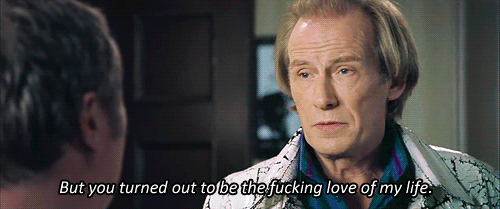
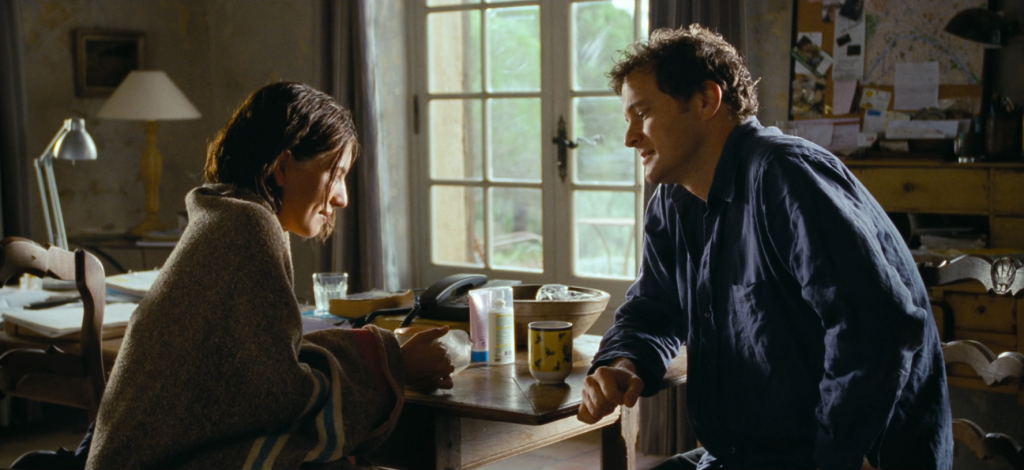
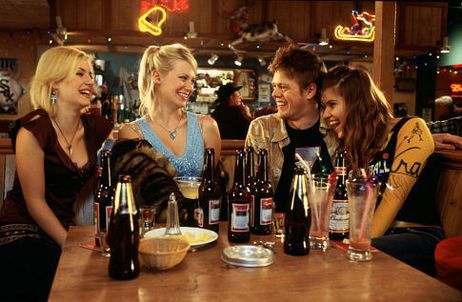
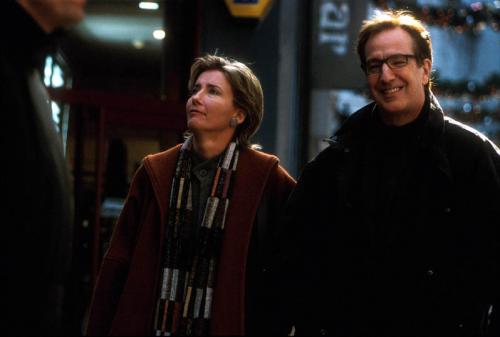
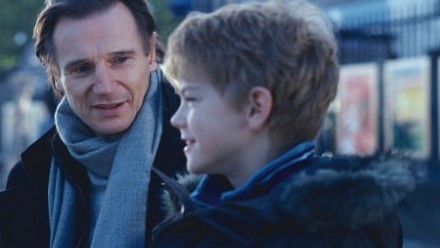
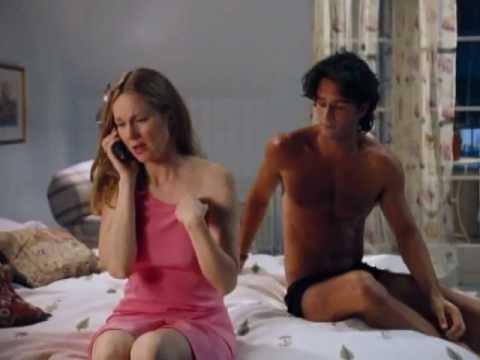
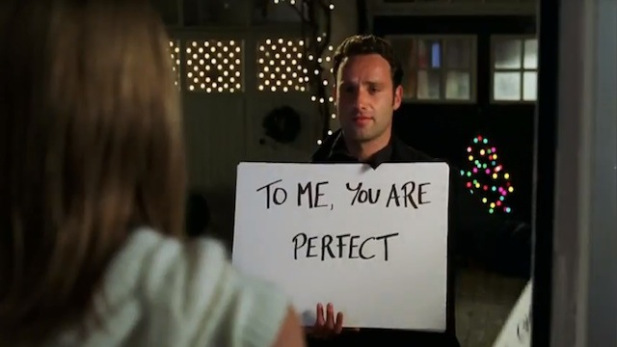




Once again one of your articles has driven me to Netflix to watch a movie I hadn’t seen yet.
Oddly enough, I somehow managed to start 15 minutes in on Netflix, and didn’t notice until I read this article. The biggest thing I missed was the bit about Colin Firth’s wife cheating on him. Everything else was either said again or made clear. I first saw the prime minister in a cabinet meeting, so I figured out who he was; I first saw Kris Marshall when he announces his intention to go to America (which apparently is the second time he does so).
If you’re curious to recreate the experience, begin the film at 17:35…I thought the movie started with Andrew Garfield criticizing the DJ at the wedding, as the DJ says, “This one’s for the lovers.
I guess it’s not a great sign when you can start well into the first act and not even realize it. But I still enjoyed this movie more than I thought I would.
Your ranking seems pretty spot-on. Some thoughts:
-Any time Andrew Lincoln uses his British voice, it seems fake to me. He just sounds more real being a gruff, on-edge American. And yeah, having your best man also be the videographer seems weird, especially since, at the point I came in, Keira Knightley says something along the lines of, “I saw you getting video at the wedding,” suggesting that he wasn’t even the official videographer. Maybe he’s just been following her around with a camera her whole life, and that’s why she’s cool with it.
-I didn’t buy Colin Firth being so awkward. I did laugh at the various subtitles gags, though (it made it hard to Netflix multitask).
-It’s dumb, but I feel a swell of pride whenever America is mentioned favorably in a foreign film. That happened a lot here.
-You’re right that a surprising number of the threads didn’t have a resolved ending. The phrase “emotional roller coaster” is cliche, but it’s what I felt during the Alan Rickman story. I know everybody says he’s hot, but I just picture him (at best) as like a kind, old, witty, vaguely asexual scholar. With that in mind, I liked him for most of the movie, and didn’t think the temptress character’s advances would prove effective. Then all of a sudden they did. I thought, “Whoa, that’s a big wrench to throw into the works this late into the movie. I mean, I guess all romantic comedies have that thing that pulls the couple apart so that they have to come back together in a big climax…but it’s going to have to happen pretty fast.” And then it didn’t.
-Liam Neeson has gravitas even when he’s doing weird or illogical things.
-The score was surprisingly epic.
-Final thought: They did a reasonably good job with such a large cast. I never knew who would pop up next. Look, it’s Rick! It’s Mr. Bean! It’s the 12 Years a Slave guy! It’s…Walter White’s big-eared billionaire rival (as the Christmas pageant MC)!
Okay, I know that was a ridiculously long-winded comment, but one more thing:
When all the characters are mysteriously united at the airport at the end for no discernible reason, Keira Knightley, Andrew Lincoln, and Chiwetel Ojiofor are all still hanging out together. Maybe Andrew Lincoln came back to the house, explained the situation via more posters, and they all agreed to an amicable open marriage.
Haha thanks for commenting. I’m glad you enjoyed the movie. Watching from the 17 minute mark is an intriguing idea… I wonder if it changed your perspective on the Liam Neeson story because it presumably cut out the funeral, right?
I’d never really thought about the score, but now that I do you’re definitely right that it adds pizzazz and energy. Just thinking about Colin Firth’s proposal scene… the score is huge in that scene.
It’s a really great cast mostly being goofy and fun so it’s charming even with my (now well-documented) qualms about the stories.
I’m glad you think the Rickman story has a weird pace to it too. It definitely throws some stuff at you.
I’d forgotten about seeing Knightley, Lincoln, and Ojiofor at the airport. It’s all the more head-scratching.
Yeah, it cut the funeral. The first i saw of them was liam neeson talking about how the son has been locked away in his room and he’s worried something is wrong. When he confronts the son they still mention that the mother just died, but it’s less of a thing.
Re. – Laura Linney & Underpants Karl
First, A+ for “underpants Karl” as a name.
Second, I am completely with you on the love story portion of your analysis. However, I think you missed the mark when considering the brother. He is HER BROTHER. He’s the only family she has left in the world, as we’re told. Of course she wants him to call, she doesn’t want the nurses at the facility to stop him. Anger and delusions exist. And I think it actually does work for the story… I completely sympathize with her wanting to talk to him, every single time, even as he’s requesting exorcisms from the pope and Bon Jovi. This is her family. She doesn’t stop loving him just because he says ridiculous, nonsensical, violent things.
People with mental illnesses do not evaporate from our midst into facilities where we never have to deal with them and “the doctors” keep them from calling us. Especially when they’re our brothers/sisters/parents/children/etc. (Especially nowadays, when space in “facilities like the one depicted” is ever shrinking, in favor of burdening families with home care… or sending people to the streets or prison: http://tacreports.org/bed-study)
I actually found their relationship to be very touching.
p.s. there is a nice deleted scene in which the brother has a few more lines: https://www.youtube.com/watch?v=YWCTpoGGBmA
p.p.s. to anyone else reading this, i am the wife who “makes” him watch this movie
As soon as I saw the premise of this post, I said to myself, ‘I hope that business with Mark and his friend’s girl is ranked last.’ So I was very pleased to see that be the case. Excellent post…there might need to be a discussion of how/why this is so many people’s all-time favorite movie, when it’s, you know, not that great of a movie.
There is no “most” in this deplorable dreck. It’s all “least.” It starts off bad and only gets worse. On a scale of 1 to 10, 10 being the lowest, this trash rates a 19. Run — don’t walk — away from this putrid pile of awfulness.
Pingback: Love Actually « The Impoverished Critic